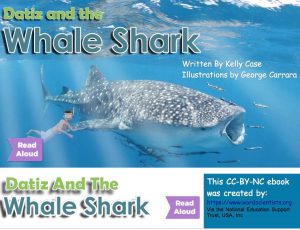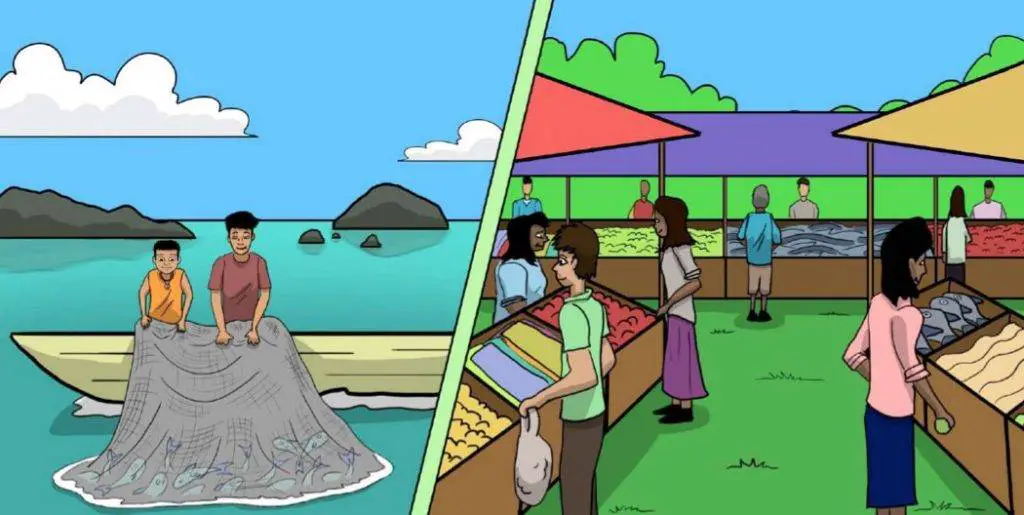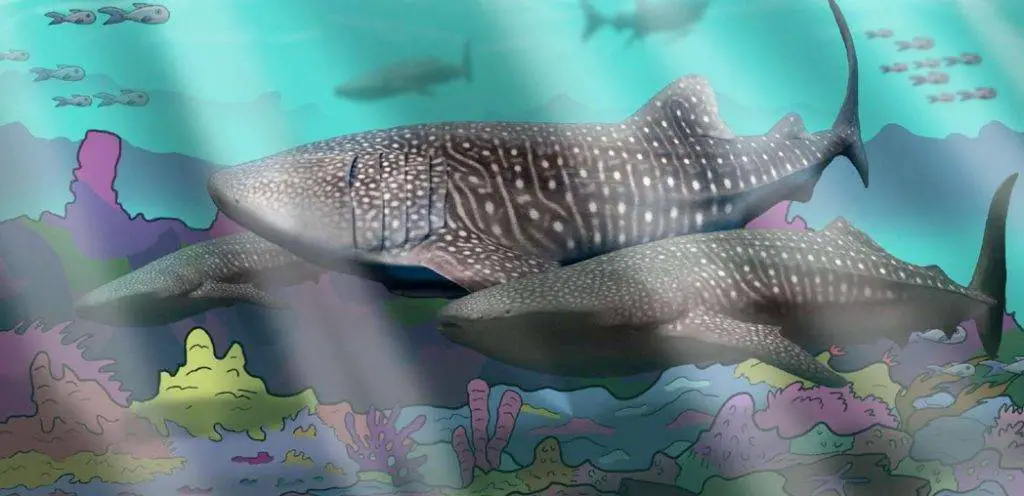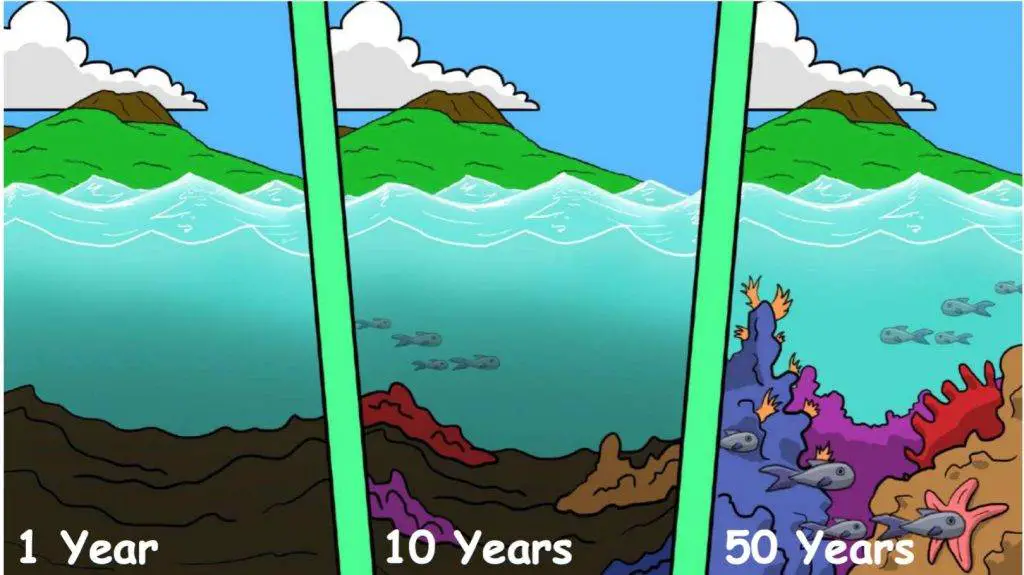 Datiz and the Whale Shark is the story of how a young boy Datiz makes a difference for his friend Splash the whale shark and his species and for the coral reef around their home. A beautiful story of conservation and how our actions can make a difference.
Datiz and the Whale Shark is the story of how a young boy Datiz makes a difference for his friend Splash the whale shark and his species and for the coral reef around their home. A beautiful story of conservation and how our actions can make a difference.
When blast fishing appears to threaten the reef around Datiz’ home, which means the whale sharks will stop coming as there will be no more fish, and eventually threaten the lively hood of the fisherman, Datiz goes on a campaign to gather support from his friends and family to only support sustainable fishing practices. Soon the restaurants and the market are forced to follow suit.
For learning about sustainable practices, and making a difference, this beautiful conservation picture book of friendship and caring for our environment is an amazing free resource.
This story takes place in Mantanani and neighbouring Sapi, small islands off the North West coast of Malaysia.
Download the pdf, or read the flipbook of Datiz and the Whale Shark on the links below the post, or you can also download the editable version here:
Datiz and the Whale Shark Open Drawing – odg
Text from Datiz and the Whale Shark
This story is about Datiz a fisherman’s son and Splash the talking Whale Shark. The story takes place in Mantanani Island, off the North West coast of Malasia.
Every day after school, Datiz meets his father on the shores of his island, Mantanani. They take their boat to the coral reefs to catch fish. Datiz loves the sea, especially swimming with the sea creatures. Datiz and his father catch many types of fish to sell at the market and to cook at home. The sea is so important to the people of Mantanani. Fishermen catch fish to sell at the market, and people buy them to cook and eat.

Every March the whale sharks swim past Mantanani as they migrate from the Philippines to Australia. Everyone comes to the beach to swim with them.
Whale sharks are the ocean’s largest fish, and they can live to be 100 years old. Despite their enormous size, whale sharks are gentle and kind. They spend most of their time near coral reefs eatingthe tiny sea creatures called plankton.
Datiz is always waiting for March to see his friend Splash, the talking whale shark.
One day Datiz’s uncle from the neighboring island of Sapi comes to Mantanani. He teaches Datiz and his father a new technique called blast fishing. “You will catch just as many fish, but in much less time,” he says. “Before all the fish disappeared from Sapi, we used to fish like this and live like kings.”
Datiz and his father try this method, and catch many fish. When the other fishermen see this, they all start blast fishing, too.
Soon, March arrives and the people of Mantanani are more excited than ever!
Datiz dives into the water to find Splash. The two friends swim around the coral reef and talk about the adventures they have had since they last saw each other.
Suddenly, they hear a loud BOOM! They see a mess of bubbles, broken coral, and dead fish floating to the surface.
Terrified, Datiz hops on Splash’s back, and they swim as fast as they can towards Datiz’s boat. There, they see a fisherman from Datiz’s village throwing fish bombs into the water.
Datiz had never seen blast fishing from underwater. He is horrified to see that it is destroying the coral reefs. Splash says, “I’m worried I won’t see you next year. I saw this happen on another island, and now we whale sharks can’t stop there, because there are no more coral reefs and plankton for us to eat.”

“Stop!” Datiz yells at the fisherman. “The fish bombs are destroying the coral reefs.”
“What are you talking about?” asks the fisherman.
“You have to stop throwing the bombs, or the reefs will disappear, and the whale sharks won’t come back next year!” exclaims Datiz.
“This is how everyone catches fish now. I cannot afford to catch less fish than the other fishermen. I need to sell them at the market,” says the fisherman.
Datiz makes a plan. First, he will tell all the fisherman on the island about what he saw. To fix this problem, all the fisherman have to stop blast fishing.
But when Datiz approaches the fishermen, his father explains, “Blast fishing has given us more fish to sell at the market, and the merchant doesn’t care how the fish are caught.”
Datiz realizes this is a bigger problem than he thought.
Datiz realizes it’s not just the fishermen. He decides to talk to the merchant. The merchant explains, “Since the fishermen have started selling me more fish, more chefs have been buying fish from me. They don’t care how the fish are caught.”
So, Datiz goes to his local restaurant to meet the chef. The chef tells him, “Since the merchants have so many fish, I have been buying them cheaply and selling meals at lower prices. My customers love the low prices. They don’t care how the fish are caught.”
Datiz realizes he needs to tell the customers at the market that if blast fishing continues, they will not be able to swim with the whale sharks anymore.
Datiz asks Splash to bring him to Sapi, where blast fishing has destroyed the coral reefs. Datiz is shocked that he sees no fish and no colorful coral reefs, only murky waters and shattered reefs. He takes pictures to show to the people back home.
Datiz swims to the island. He sees one lone fishermen on the beach working on his boat. The fisherman is surprised to see Datiz and asks what he is doing on Sapi. Datiz replies, “I am here to learn about what happened to your coral reefs, can you tell me the story?”
The fisherman responds, “It is a very sad story. Our island used to be full of fish and beautiful coral reefs. The whale sharks would come every year until we started blast fishing. We were catching so many fish, and no one cared about the reefs. We were just happy to have a surplus of fish. Finally, one year, the whale sharks did not come, and there were no more fish to catch. Then we dove under the water and saw the coral had died. There was no place for the fish to live and no food for them to eat. Now all we can do is wait for our coral reefs to grow back.”
Datiz rushes back to Splash and tells her the fisherman’s story. They decide they must tell the people of Mantanani that blast fishing in not sustainable. If people continue blast fishing, soon there will be no more coral reefs and no more fish for people to eat.
It is time for Splash to join the other whale sharks to continue their journey. Datiz promises Splash that he will share the story of Sapi and convince his community to care how their fish are caught, so they can save their coral reefs and the whale sharks can continue to visit their island.
Datiz works all night, printing out the pictures from the coral reefs of Sapi, and learning more about the terrible effects of blast fishing.
The next day at school, Datiz shows his class the pictures and tells them how important it is that they catch fish in a sustainable way. One student asks, “But what can we do?”
Datiz explains, “When we buy fish, we have to demand that the fish be caught in a sustainable way. If not, soon we won’t have any fish, and worst of all, the whale sharks will stop coming!” The other students rush home to tell their families.
A few days later the chef asks to speak with Datiz. “All my customers suddenly want the fish I cook to be sustainably caught! What do I do?”
Datiz shows his pictures of Sapi and explains that even though the chef has plenty of fish for his customers now, it is not sustainable. Soon, there will be no fish for him to serve. The chef says, “I will no longer buy fish that have been caught using fish bombs, and I will encourage the other restaurants to do the same. We must share your story with the merchant”.
Datiz and the chef go to the merchant. The merchant says, “Suddenly, my customers won’t buy fish that were not sustainably caught. I don’t understand.”
Datiz shows him his pictures of Sapi and explains that even though she has many fish to sell now, soon she will have none. The merchant tells him, “I will no longer accept fish that were caught with fish bombs. We must share your story with the fishermen.”
Datiz, the merchant, and the chef go to speak with the fishermen. The merchant tells the fishermen that his customers will not buy fish that were caught with fish bombs.
“We don’t understand, if we are able to catch so many fish, how can this be unsustainable?” Asks a fisherman.
Datiz shows them his pictures of Sapi and explains that even though they have plenty of fish now, in a few years there will be no coral reefs and no fish.
Datiz’s father listens with tears in his eyes. He says, “I am so sad that our friends on Sapi have no more coral reefs and no more fish to eat. We will share this story
with the other fishermen.”
Next March arrives, and Datiz is excited to see Splash!
The friends swim around the reefs, which are still colorful and full of life. Splash tells Datiz, “Thank you for teaching the fishermen how to sustainably fish. The reefs are so beautiful because you never gave up!”
Datiz is happy, but he asks, “What about Sapi? How do their reefs look?”
Splash smiles and says, “Their reefs are getting better. Soon, the people of Sapi will have plenty of fish to eat and the whale sharks will visit there again.”

If we protect the coral reefs from further damage, over time they will recover.
Epilogue: 50 years have passed and the whale sharks continue to migrate from the Philippines to Australia each year in search of warmer water and more plankton. Splash brings her family now and remembers the adventures she and Datiz had years ago as they journeyed past Mantanani. Splash tells the young whale sharks about blast fishing and how she and Datiz were able to help make a difference. She remembers how the reefs used to look and smiles as she watches her pups swim and play through the colorful and lively reefs of Sapi.
<End of text from Datiz and the Whale Shark – A story of coral reef conservation>
You can see more stories from WordScientists in our Wordscientist Publisher category, or at https://www.wordscientist.org
Visit WWF Whale Shark Conservation page to find out more about Whale Sharks,

Datiz and the Whale Shark – English Worksheet
Answer true or false to the following questions:
- The whale sharks migrate from the Phillipines to Australia.
- Sapi is where Datiz lives.
- Blast fishing is a sustainable practice.
- Datiz’s action help people to support sustainable practices.
- Mantanani is a neighbouring island to Sapi.
- To _ _ _ the problem the fishermen have to stop _ _ _ _ _ _ _ _.
- Customers suddenly want the _ _ _ _ I cook to be sustainably _ _ _ _ _ _.
- Datiz shows his class the _ _ _ _ _ _ _ _ of the _ _ _ _ _ reef at Sapi.
- Datiz tells them how important it is that they _ _ _ _ _ fish in a _ _ _ _ _ _ _ _ _ _ _ way.
- The chef says he will _ _ _ buy fish caught with _ _ _ _ _ .
Provide a definition or description of the following words:
- murky
- merchant
- migrate
- shattered
- unsustainable
Provide a short response to the following questions:
- Why did all the fish leave Sapi?
- Why do you think the fishermen did not realise the bombs were destroying the coral?
- Will the reefs at Sapi recover?
Write a paragraph on the following topics:
- Do you know of any practices in your region that are not sustainable? Research if you do not know, and write about a practice you have learned about that needs to be stopped.
- Write about what you think could happen to our wildlife and natural environment if people do not use sustainable conservation practices.
Download the above reading comprehension questions:
Datiz and the Whale Shark Reading Comprehension worksheet – pdf
Download Datiz and the Whale Shark Reading Comprehension worksheet – txt
See more of our books about conservation here below
[display-posts category=”Conservation” include_excerpt=”true” image_size=”thumbnail” wrapper=”div” wrapper_class=”display-posts-listing grid” meta_key=”_thumbnail_id”]
See more of our books for that help support an important cause here below
[display-posts category=”Books for a Cause” include_excerpt=”true” image_size=”thumbnail” wrapper=”div” wrapper_class=”display-posts-listing grid” meta_key=”_thumbnail_id”]











Yes I liked the story because it was exciting what was happening and because you learn about the whale shark.
me and my 7 year old approve ! two pictures are upside down but nice artwork
Hi, I’m so sorry, must have been rushing and forgot to do a final edit check, I will fix this tonight as soon as I get back fromm work.
Fixed! Again so sorry…I have a day job so it work is rushed sometimes. FYI if you print the books from the creator’s site50% come out upside down, so since it is licensed as CC, we decided to help user accessibility by creating these editable and more viewable pdfs, Lots more lovely resources on Wordscientists.org, I’ll be bringing more soon, but will make sure to check the imge rotation next time!!
Simply beautiful story and an important lesson – we all need to ensure we follow and promote sustainable practices,